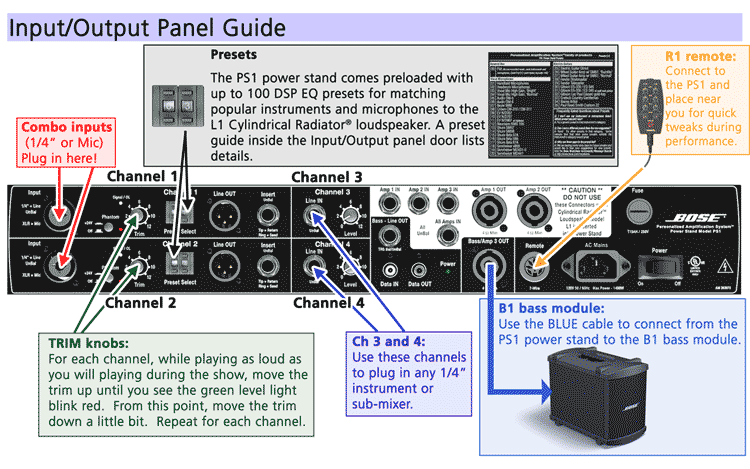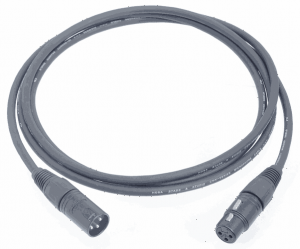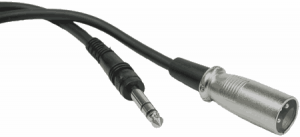Difference between revisions of "PS1 Powerstand Connections"
(→XLR (balanced) to ¼ Inch Tip-Ring-Sleeve (balanced): rewritten for clarity) |
(=== XLR Female (balanced) to ¼ Inch Tip-Sleeve (unbalanced) ===) |
||
| Line 43: | Line 43: | ||
[[Image:xlrFtrsM.png|XLR female to Tip-Ring-Sleeve]] | [[Image:xlrFtrsM.png|XLR female to Tip-Ring-Sleeve]] | ||
| − | This should work well if the mixer output is +4 dBU as this is a reasonable match for signal level, with any of the ¼ Inch inputs for Power Stand Channels 1, 2, 3, 4. Those inputs are all unbalanced, so there is no particular advantage to using this balanced cable compared to an unbalanced cable. | + | This should work well if the mixer output is +4 dBU as this is a reasonable match for signal level, with any of the ¼ Inch inputs for Power Stand Channels 1, 2, 3, 4. Those inputs are all unbalanced, so there is no particular advantage to using this balanced cable compared to an unbalanced cable. There is no particular benefit to using this kind of cable as compared to the one below. |
| + | |||
| + | === XLR Female (balanced) to ¼ Inch Tip-Sleeve (unbalanced) === | ||
| + | [[Image:xlrFtxM.png|XLR Female to 1/4 Inch Tip Sleeve]] | ||
| + | |||
| + | This should work well if the mixer output is +4 dBU as this is a reasonable match for signal level, with any of the ¼ Inch inputs for Power Stand Channels 1, 2, 3, 4. Those inputs are all unbalanced. There is no particular benefit to using this kind of cable as compared to the one above. | ||
| + | |||
== Other (not Mixer) == | == Other (not Mixer) == | ||
Revision as of 18:30, 28 July 2007
PS1 Connections Channels 1 & 2
Contents
Connections from Mixer
This section is an overview of connections you can make from a mixer (mixing desk) to the PS1 Power Stand (Classic) / Model I. For specific examples see: Mixers.
XLR (balanced) to XLR (balanced)
(balanced to balanced) should be fine. This is the same kind of cable you would use to connect a microphone.
Things you can do if the signal is too hot (you are having trouble with the input clipping on the Bose System)...
- check to see if there is a 'pad' built-in on the mixer (most Mackie mixers have this on the panel beside the XLR outs)
- turn down the main outs on the mixer
- use a 20 dB Pad (attenuator) between the mixer and the Bose System.
¼ Inch Tip-Sleeve (unbalanced) to ¼ Inch Tip-Sleeve (unbalanced)
(unbalanced to unbalanced) is fine:
You could have difficulty if you are running long lines (and losing signal or picking up noise). If you are, consider using shorter cable runs, or running an balanced line. To do this you can use a short unbalanced cable to a DI (to convert from unbalanced to balanced) and run from there: XLR to XLR (balanced to balanced) to the Bose System.
Balanced to Unbalanced
The PS1 Power Stand (Classic) / Model I Channels 1 and 2 ¼ inch inputs are unbalanced. There are many kinds of cables that will work but no connection that uses the ¼ input will be balanced because the internal connection is unbalanced.
¼ Inch Tip-Ring-Sleeve (balanced) to ¼ Inch Tip-Sleeve (unbalanced)
This should work, but likely no better than a simple ¼ Inch Tip-Sleeve to Tip-Sleeve cable. This is because the ¼ Inch input on the Bose System is Tip-Sleeve (unbalanced) anyway.
¼ Inch Tip-Ring-Sleeve (balanced) to ¼ Inch Tip-Ring-Sleeve (balanced)
This should work, but likely no better than a simple ¼ Inch Tip-Sleeve to Tip-Sleeve cable. This is because the ¼ Inch input on the Bose System is Tip-Sleeve (unbalanced) anyway.
XLR (balanced) to ¼ Inch Tip-Ring-Sleeve (balanced)
This should work well if the mixer output is +4 dBU as this is a reasonable match for signal level, with any of the ¼ Inch inputs for Power Stand Channels 1, 2, 3, 4. Those inputs are all unbalanced, so there is no particular advantage to using this balanced cable compared to an unbalanced cable. There is no particular benefit to using this kind of cable as compared to the one below.
XLR Female (balanced) to ¼ Inch Tip-Sleeve (unbalanced)
This should work well if the mixer output is +4 dBU as this is a reasonable match for signal level, with any of the ¼ Inch inputs for Power Stand Channels 1, 2, 3, 4. Those inputs are all unbalanced. There is no particular benefit to using this kind of cable as compared to the one above.
Other (not Mixer)
¼ Inch Tip-Ring-Sleeve (balanced) to XLR (balanced)
Specialized instrument cable (probably Guitar)
This is probably a specialty cable that was supplied with the instrument. It is intended for a microphone input on a mixer. This should work fine with the Bose System.
XLR Female (balanced) to ¼ Inch Tip-Sleeve (unbalanced)
This is often used as a Microphone adaptor cable.
This will probably not work very well. Sometimes you see these being used for home karaoke machines. These are not suitable for professional use. The ¼ Inch input was designed for high impedance line-level inputs and may not provide enough gain for a microphone which is probably low impedance.
¼ Inch Tip-Sleeve (unbalanced) to XLR Male (balanced)
This is probably an Instrument adaptor.
This may not work particularly well. You are probably running an impedance mismatch (high impedance from the instrument to low impedance balanced XLR).
This page was originally posted in the Bose® Musicians Community Message Boards
PS1 Powerstand I/O Panel (Interactive Display)






